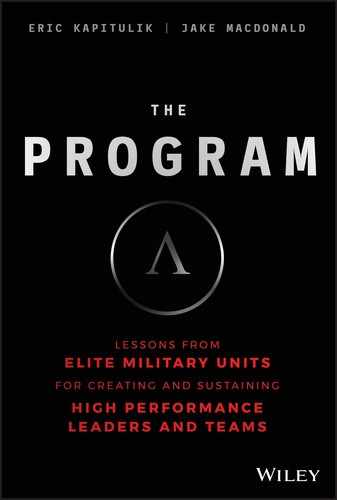32
The Second Standard of a Leader: Take Care of Your Teammates
THE SECOND STANDARD to which every leader is held is Take Care of Your Teammates. When Eric was at the Infantry Officer’s Course (IOC), he and his teammates had an opportunity to meet a Marine Corps legend. They were coming to the tail end of “The War,” the culminating exercise at IOC, and a brutal test of their leadership ability while battling hunger, extreme fatigue, and brutal weather conditions. There was over two feet of snow on the ground for its entirety. Eric and his teammates knew someone important was arriving when they were called in and ordered to sit around a large fire to prepare for the guest speaker. It was the first warmth they had been allowed in almost two weeks, and they knew that it had to be quite a special guest. They were still surprised when they were joined by General Al Gray. General Gray had served as the 29th Commandant in the Marine Corps and was revered as a leader and a warrior. For his official commandant’s picture, he chose not to wear the dress blue uniform (the Marine Corps’ formal uniform adorned with medals and ribbons) that every commandant before, and since, has worn. Instead, he took the photo wearing his camouflage uniform, the uniform that Marines wear into battle. As infantry officers in training, the opportunity to spend time with Al Gray was special. The young lieutenants were afforded the opportunity to ask him questions about his experiences. One of the lieutenants asked for the best piece of advice he could give that would ensure their being successful as Marine officers. Without hesitation, General Gray started by explaining that “being successful” meant a lot of different things to different people, just as it would for the young lieutenants surrounding the fire that night. He went on to clarify that to some, being successful might mean becoming a general or, even more impressive, attaining the title of commandant. Having accomplished both, he didn’t define “being successful” that way and he suggested that the young infantry officers didn’t either. As he highlighted, the title you achieve in every organization other than your family is more of a reflection of your reputation. Reputation is what other people think you are. Instead, be more focused on your character. Character is who you actually are. General Gray went on to further explain that he wasn’t sure if those in attendance that day would serve in the Marine Corps for 4 years or, like him, for 41 years. Therefore, rather than provide guidance on how to be successful as a Marine Corps officer, he wanted to share with them how to be a “success” throughout their entire life, not just the period of it that they would spend on active duty. General Gray proceeded to tell the Marines, “Warriors, as the term would suggest, to be successful, you must accomplish the mission. Whatever your mission is as an individual and more importantly on the teams of which you will be privileged to be a part, do so honorably, but accomplish it.” General Gray continued, “But to be a true ‘success,’ you must take care of your people, be they your Marines, your corporate co-workers, and most certainly, your friends and family. Your children do not have the luxury of choosing their parents. You, however, will have a choice as to what sort of father you will be. This will be generally true for you throughout your entire life on all the teams of which you will be a part. Your subordinates don’t choose you, but you will have a choice of what type of leader you will be for them. Therefore, to be a success, accomplish the mission and take care of your teammates. The way you do so is by making every single decision you ever make by thinking about what is in the best interest of the team, first!” General Gray, a no-nonsense, straight-shooter communicator, closed this way: “I guarantee you that not all of you will.” He paused. “Titles, money, your reputation, who other people think you are, will become a greater priority than those two standards that I spoke of that help ensure the success of the teams you will lead throughout your life.” As someone who has no problem with silence, General Gray finished and just sat there staring at the young lieutenants. None moved. Only a few even breathed. After what seemed like an eternity, Eric’s best friend, Naval Academy and IOC classmate, and fellow infantry officer Doug Zembiec, the toughest of all the lieutenants, stood up, screamed “WOOOOOHOOOOOOO!” at the absolute maximum volume, in the middle of the Virginia wilderness, and started clapping and cheering wildly. Anyone who knew or served with Doug Zembiec (KIA May 11, 2007, Baghdad, Iraq), one of the biggest successes and most legendary Marines in modern times, will attest that he did accomplish the mission and he did take care of his people. Every single decision he ever made was done with his team’s best interest at heart first. For those other Marines who also shared the fire that day, they will also attest that not all of them did. We all define “being successful” differently, but by The Program’s definition, like General Gray’s, the most successful leaders on any battlefield consistently accomplish the mission and take care of their people. Not all leaders do, though. As General Gray highlighted, titles, money, our reputation, and who other people think we are, all become a greater priority than those two standards. Don’t allow it. Stay focused on accomplishing the mission and making every decision we make with the team’s best interest at heart first. Take care of your people.
